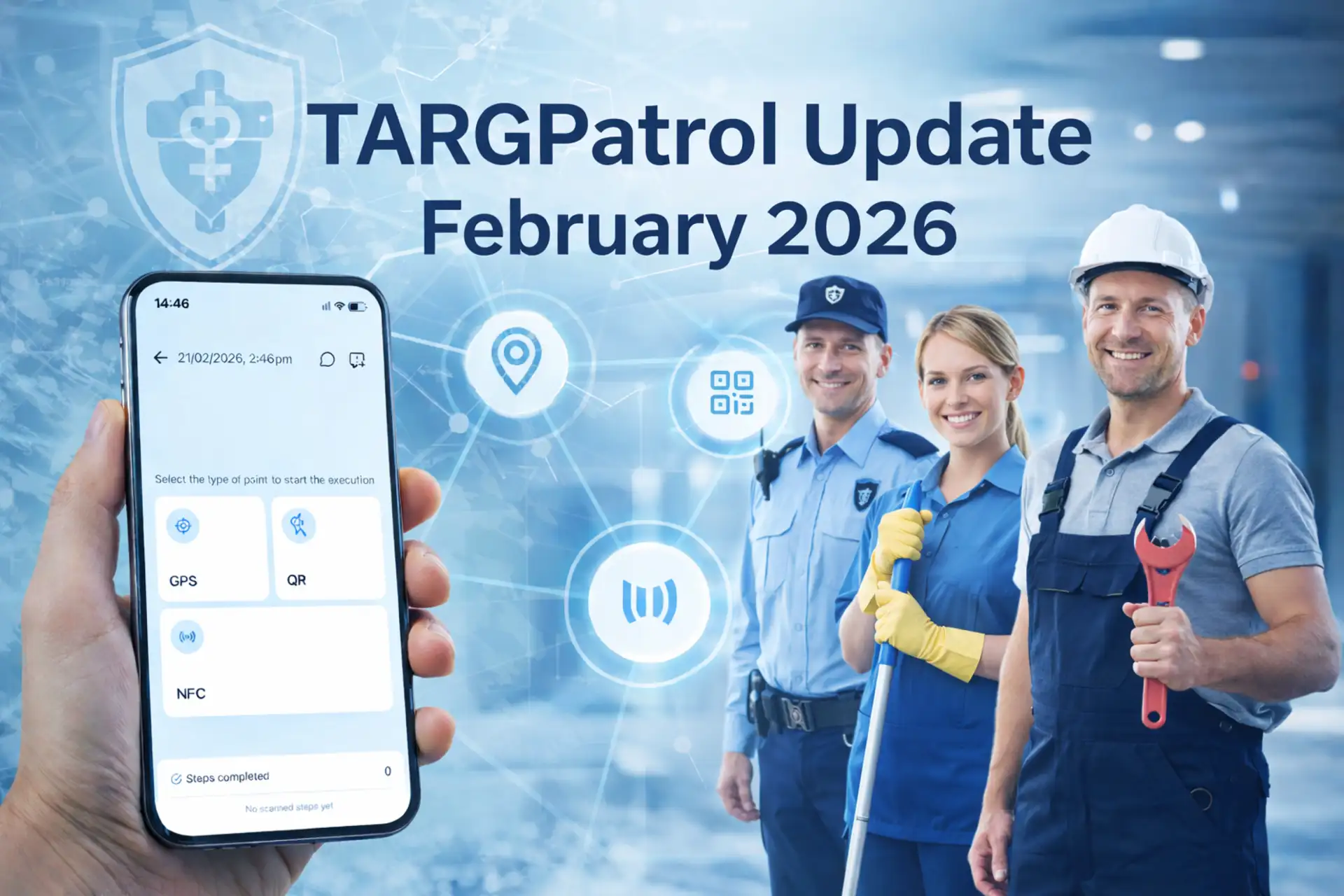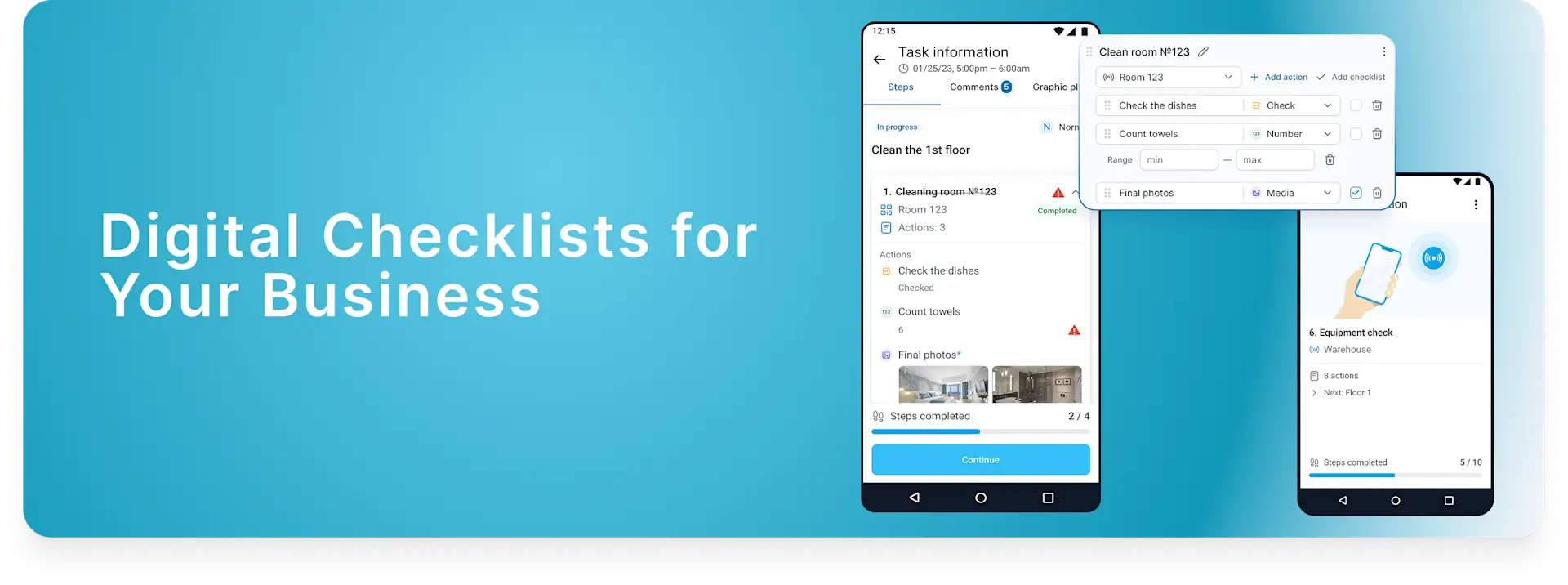7 Best Field Service Management Software in 2025
Top 7 field service management software solutions 2025
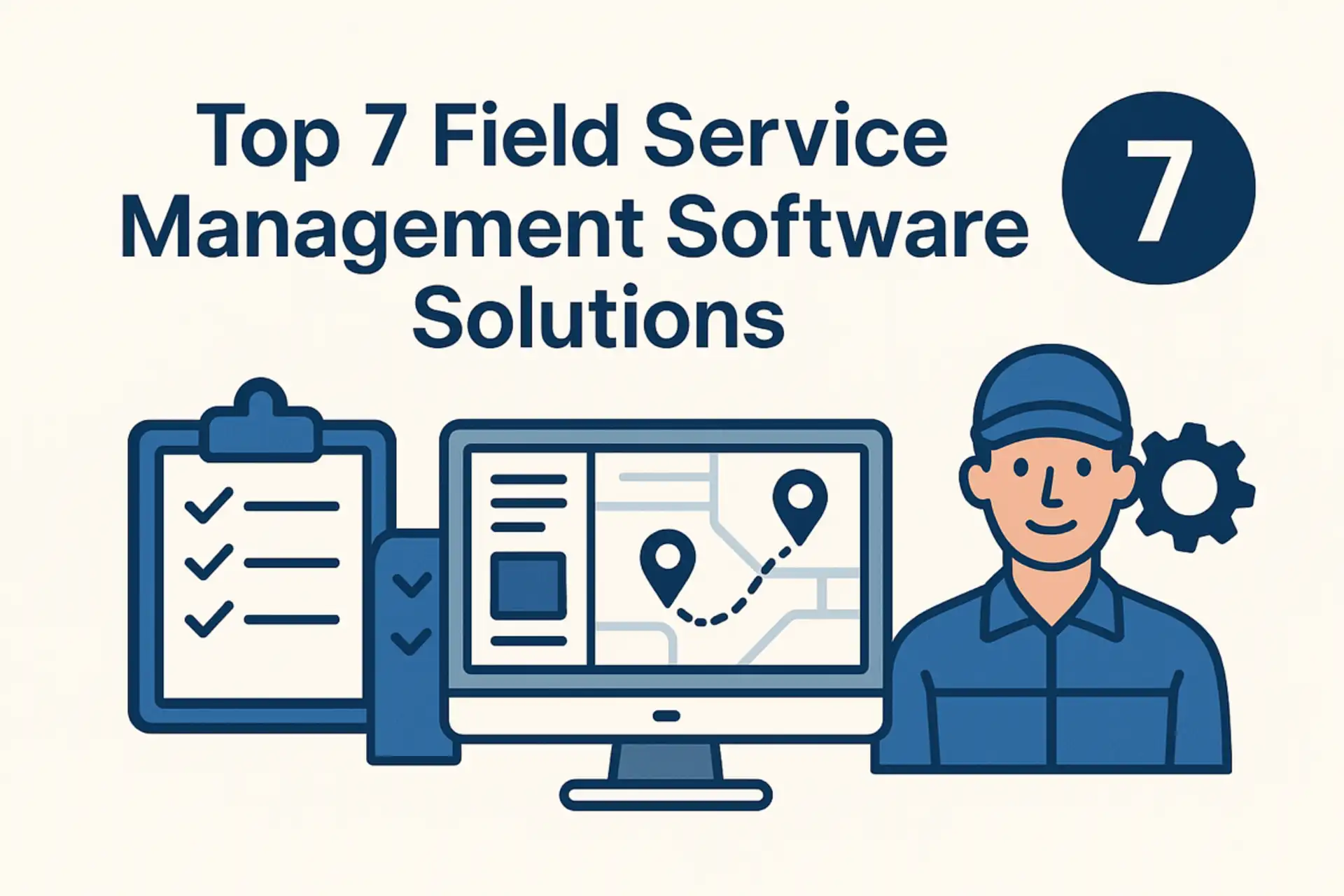
Fieldwork can be chaotic — leading to more than just misplaced mugs or forgotten phones. Teams often face confusing communication, double-booked schedules, and delayed or missed appointments. These issues can lead to unhappy customers, wasted time, and unnecessary costs.
Field service management software helps mobile teams stay organized and connected with office staff and supervisors. In this guide, we’ll explain what field service management software does, highlight its main features and advantages, and review seven leading platforms that can transform your remote and mobile operations.
How does field service management software work?
Field service management (FSM) software streamlines how companies oversee field operations and resources. It automates key processes such as scheduling, dispatching, tracking issues, and managing job orders. On-site technicians gain real-time access to company systems and client updates, improving responsiveness. When integrated with a modern help desk, FSM software minimizes manual scheduling, dispatch, and communication tasks, reducing errors and saving time.
Top 7 Field Service Management Software Platforms
Here are seven leading platforms to help manage your field service operations. Whether you’re a small startup or a large enterprise, field service software streamlines work for teams in the field.
1. TARGPatrol
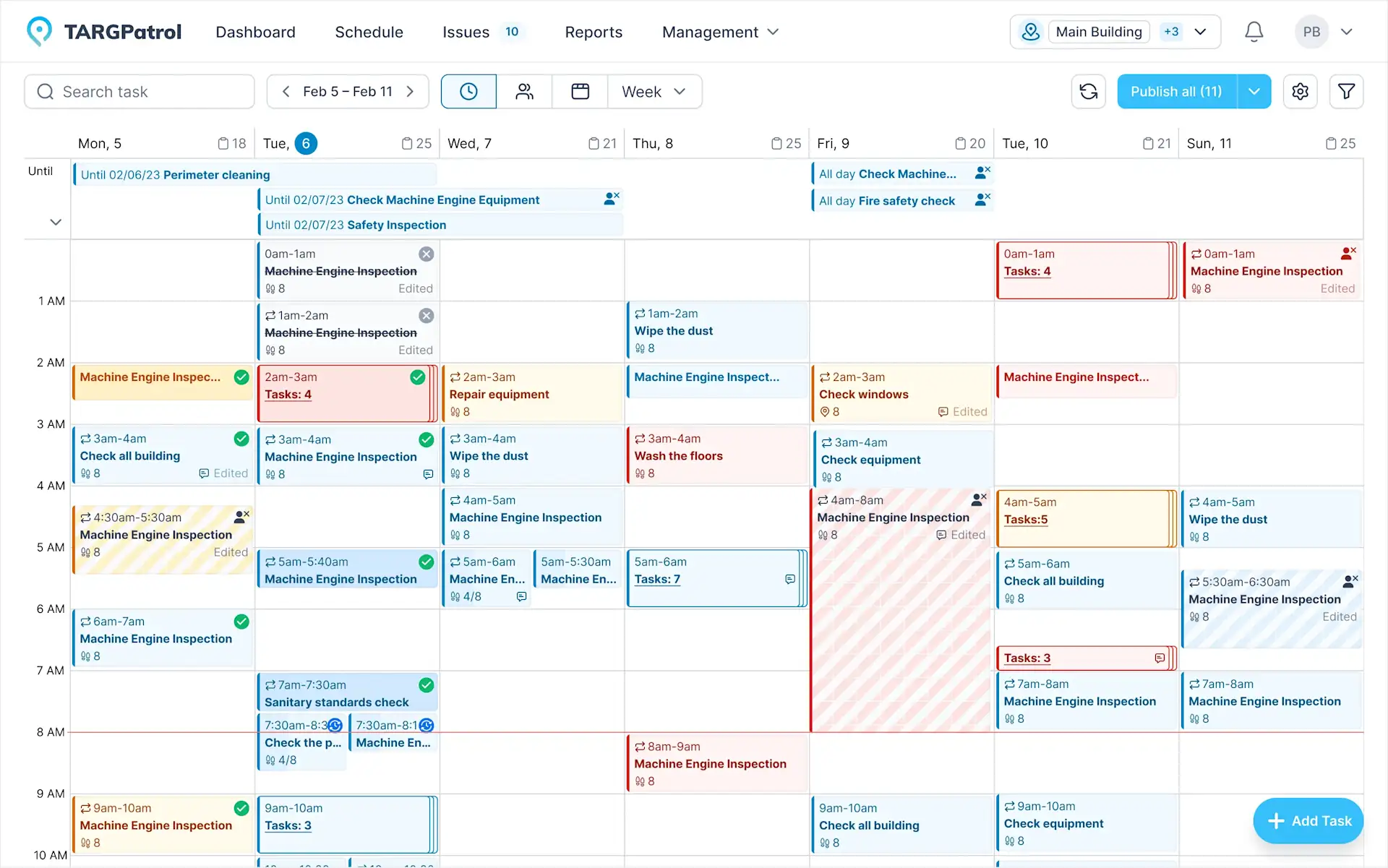
TARGPatrol is an advanced cloud-based platform tailored for field service management and remote workforce operations. Its powerful scheduling engine automatically matches tasks to the right team members based on skills, availability, and geographic proximity, reducing travel times and operational costs.
The platform offers a highly flexible mobile app, enabling field teams to view schedules, check in at locations via QR codes, NFC tags, or GPS, and complete tasks even in offline mode. Managers gain full visibility into live operations through dashboards, analytics, and comprehensive reporting tools.
TARGPatrol’s integration capabilities, including REST API and Webhooks, make it simple to connect with ERP systems, help desks, or other business software. This ensures seamless data flow across departments and enhances overall efficiency.
Features like digital checklists, photo/video attachments, real-time alerts, and advanced geofencing give businesses precise control over field activities while improving accountability and service quality.
Features:
Live dashboards and analytics
QR, NFC, and GPS-based check-ins
Mobile app for iOS and Android with offline mode
Digital forms, checklists, and media attachments
Work order tracking and real-time updates
REST API and Webhooks for integrations
Inventory and asset tracking
Notifications and messaging for field teams
Location-based insights and reporting
Pricing: Paid plans start at $15 per user/month or $12 per user/year . A lifetime free plan is available for up to 10 users.
2. Zuper
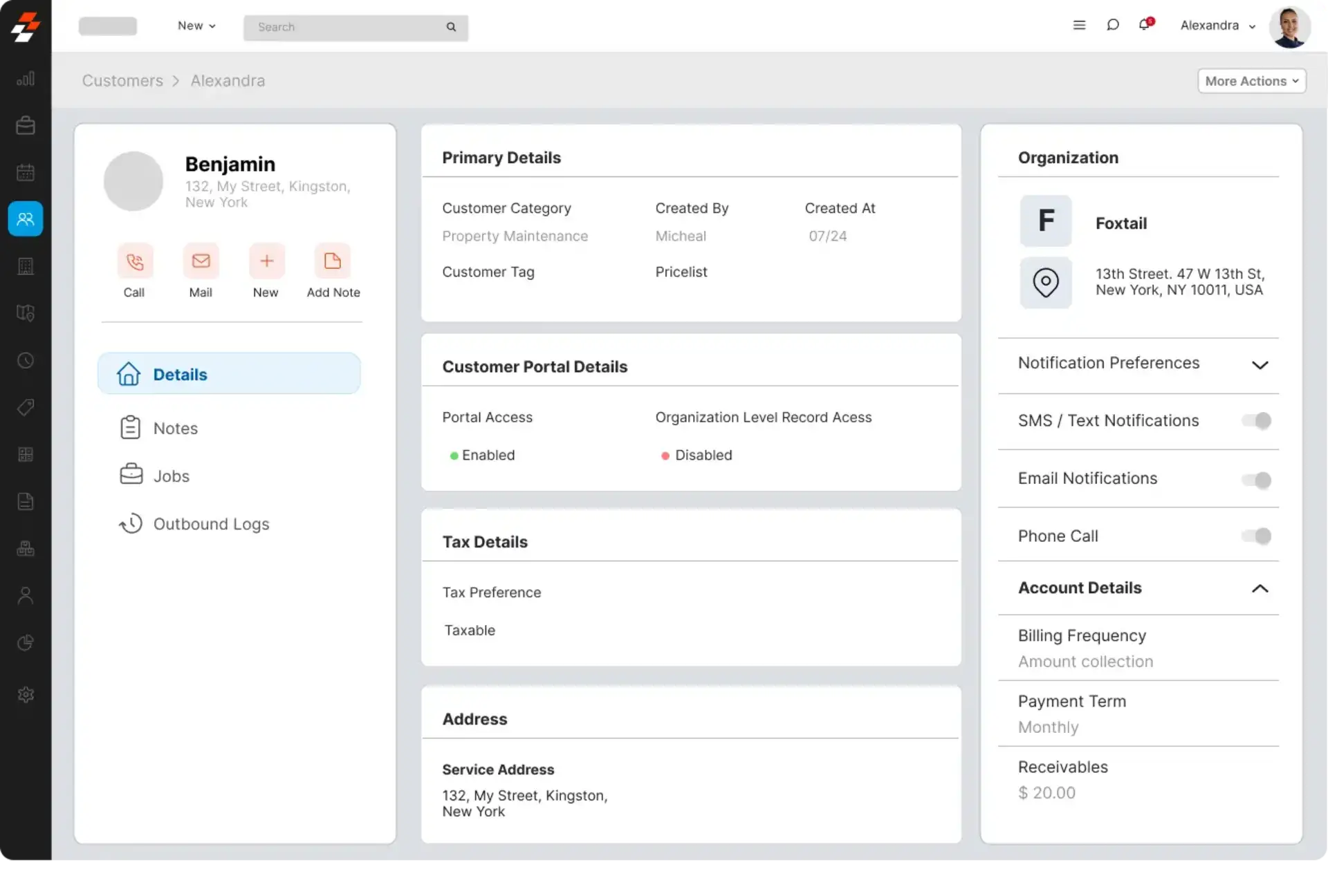
Zuper offers a unified solution for managing field service operations and remote teams. Its intelligent, AI-powered dispatch system matches technicians to jobs based on their skills and location, ensuring the right person is sent to each site. The platform keeps clients updated throughout the process, from booking to post-service feedback.
Zuper’s detailed analytics and reporting tools provide teams with real-time insights to support informed decisions. Support staff can monitor inventory and even track a technician’s mobile battery status. Integrating Zuper with customer service platforms allows businesses to schedule, dispatch, and monitor field services directly, enhancing operational efficiency.
Features:
Live dashboards and analytics
SMS notifications for customers
Mobile app for field teams
Task scheduling and assignment
Work order tracking
Stock and inventory tracking
Location-based insights
Pricing: Contact Zuper. A 14-day free trial is available.
3. Jobber
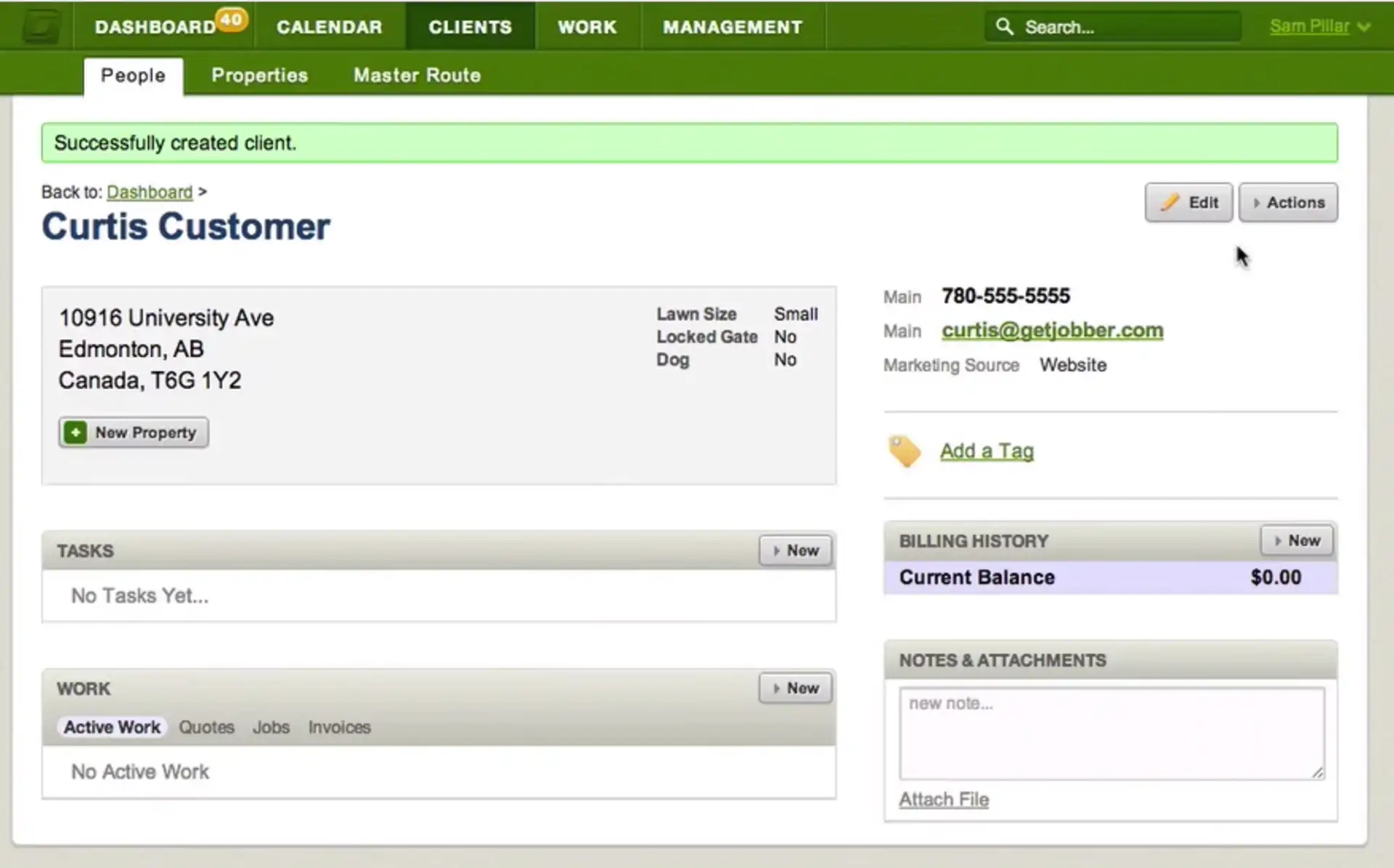
Jobber’s service software is designed for the construction and home services sectors. Customers can schedule appointments online, communicate with technicians via text, and get automatic notifications and confirmations for their appointments.
The business dashboard gives a clear view of current requests, quotes, jobs, and invoices. The software also suggests next steps to keep work moving forward. Team members can track job information, work hours, and expenses directly from the dashboard.
Features:
SMS for customers
Mobile app for field teams
Task scheduling and dispatch
Managing work orders
Automatic alerts and confirmations
Client portal
Pricing: Plans start at $168 per month up to 5 users.
4. Skedulo
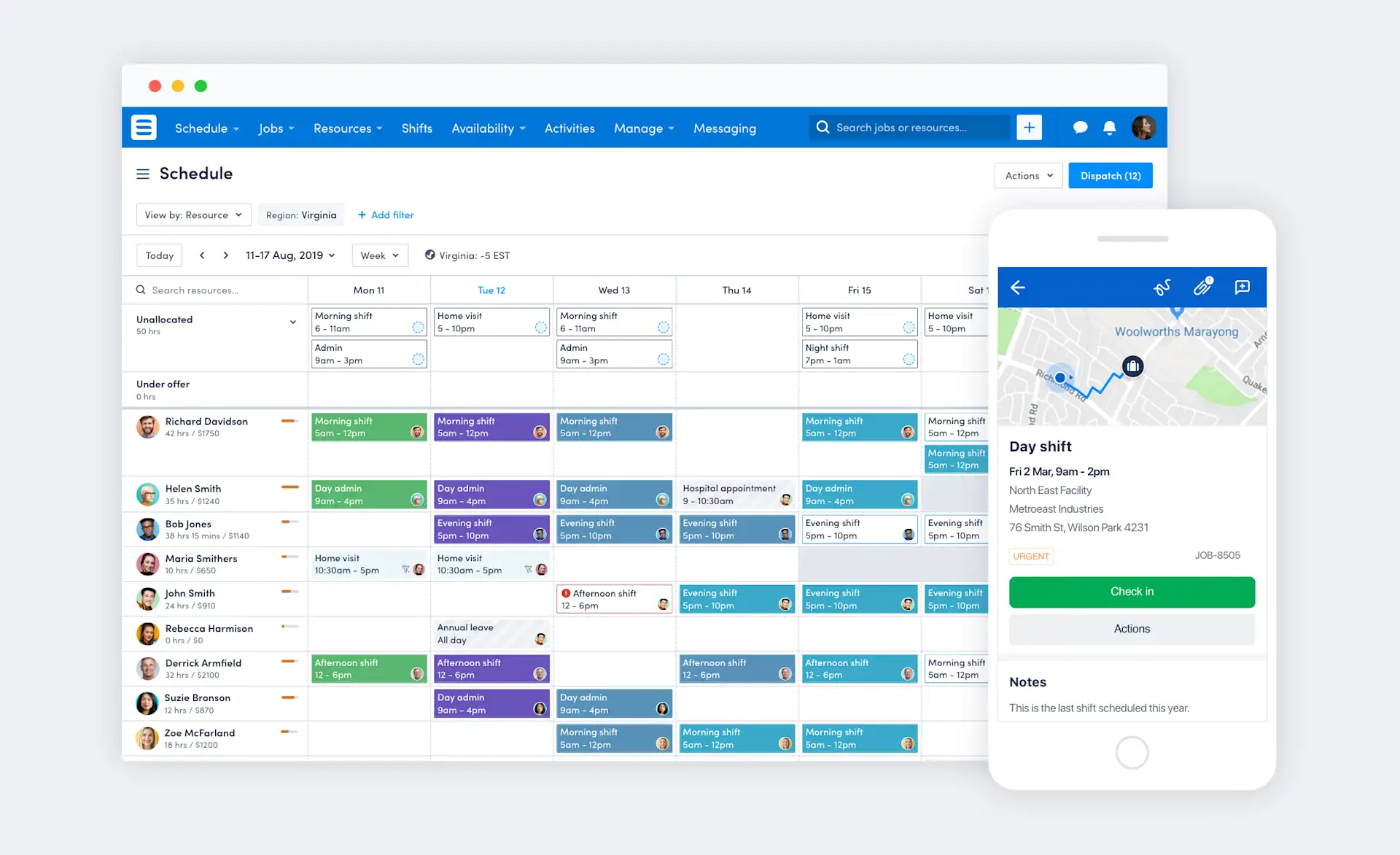
Skedulo’s platform supports mobile workforce management by streamlining workflows, offering actionable insights, and bringing together essential tools. Its Deskless Productivity Cloud enables businesses with remote teams to easily manage workers with different skills, certifications, locations, and schedules.
The scheduling feature leverages intelligent automation to align job assignments with complex customer requirements. Field employees can use the mobile app for real-time updates and clear instructions.
Features:
Live dashboards and reports
Mobile app for field teams
Task scheduling and assignment
Smart automation features
Instant push alerts
Pricing: Contact Skedulo.
5. Housecall Pro
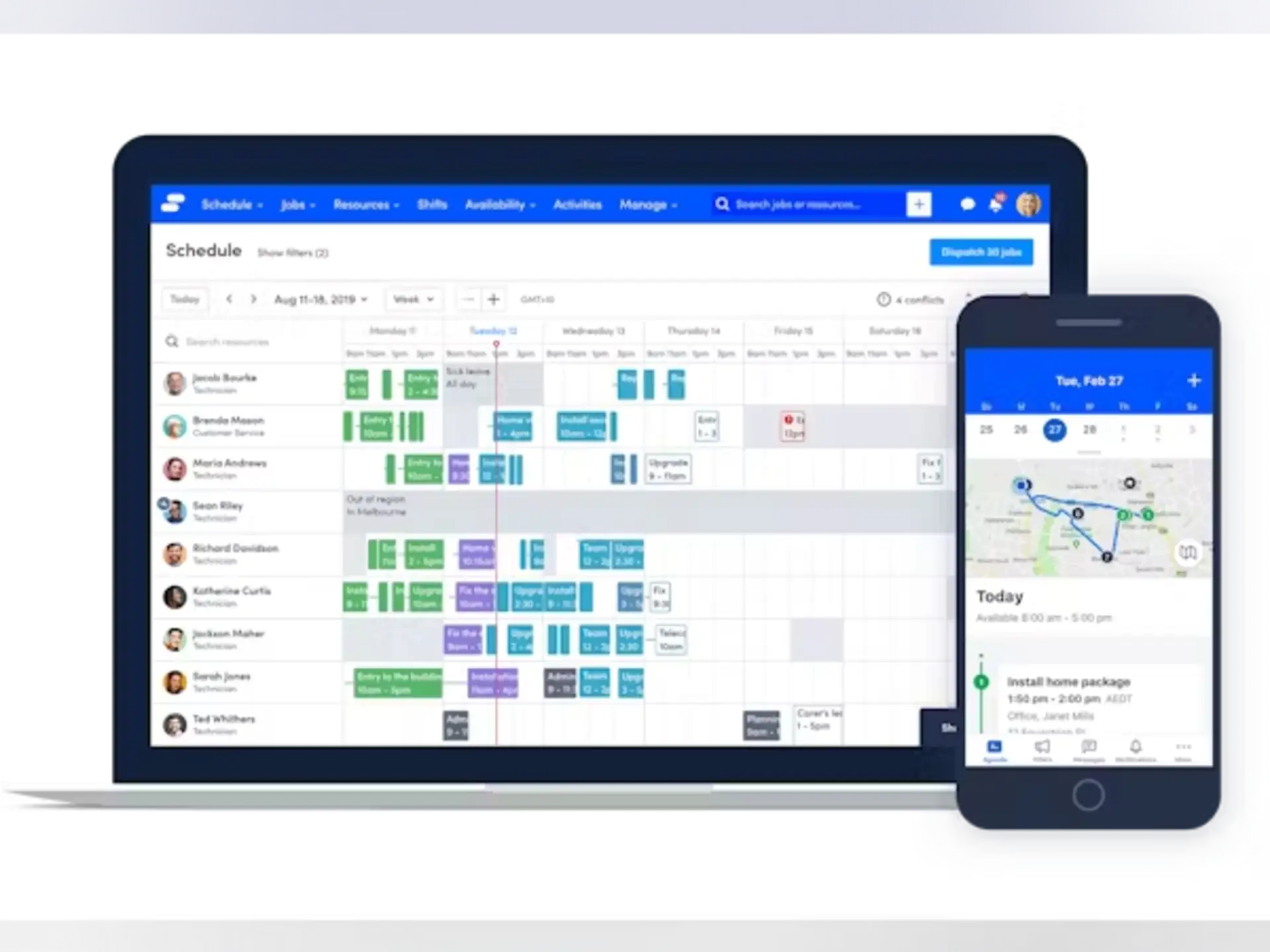
Housecall Pro offers software designed for home service businesses. With GPS tracking, dispatchers can see where field technicians are in real time, making it easy to adjust routes and assign tasks efficiently. Both dispatchers and technicians can send automated appointment reminders and updates to customers via text messages.
The platform also includes a review management feature that supports building a strong online reputation. Once a service is complete, customers automatically receive a request to leave feedback. These reviews can then be shared with prospective customers to help generate more business.
Features:
Live dashboards and analytics
SMS notifications for customers
Mobile app for field teams
Task scheduling and assignment
Work order tracking
Location monitoring with GPS
Automated review requests
Pricing: Plans start at $49 per month for one user, billed annually.
6. Salesforce Field Service
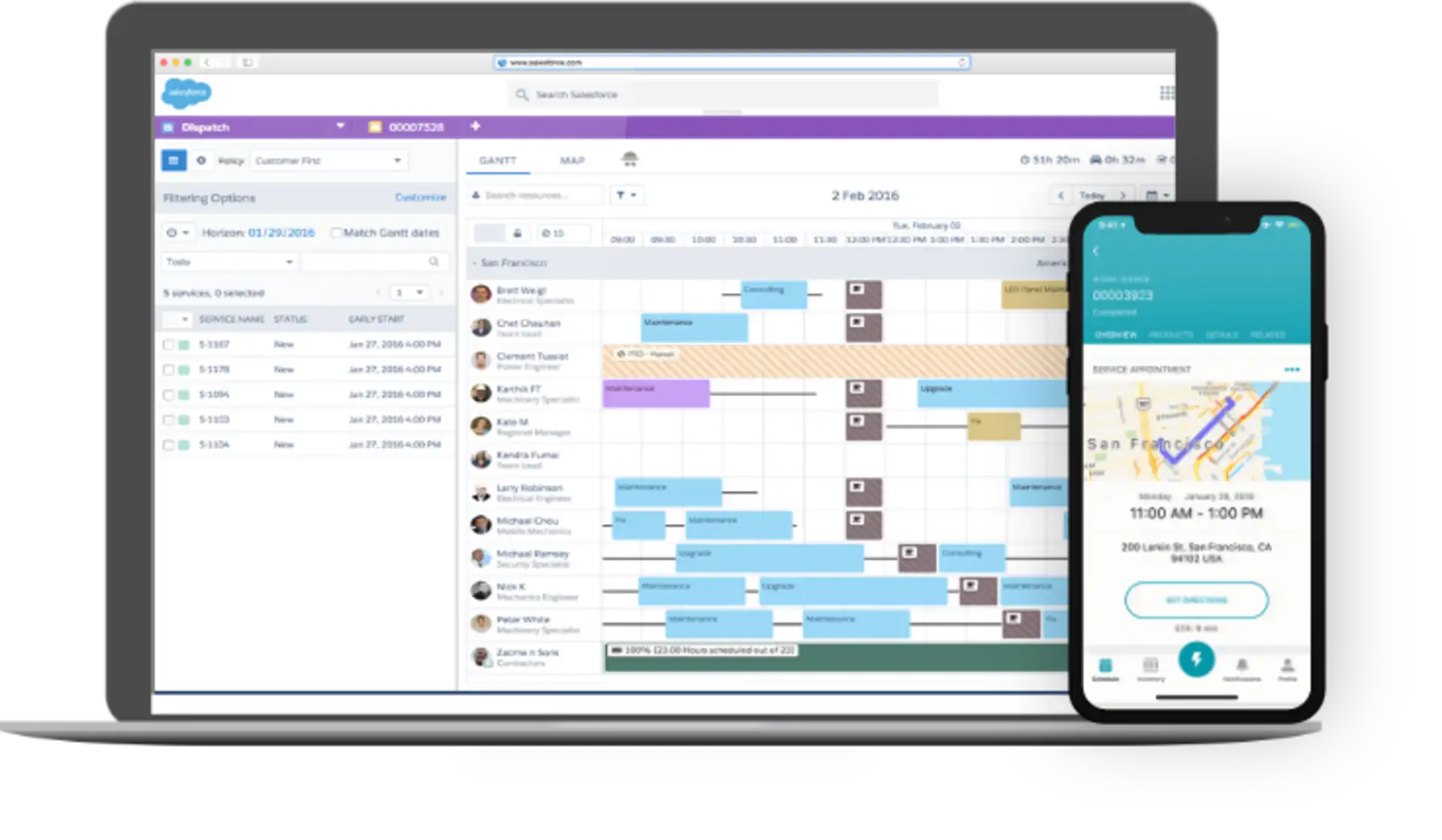
Salesforce Field Service is a software solution designed to track and manage mobile teams. Its mobile app enables technicians to access appointment details, check their schedules, and update information directly from their phones, even while traveling. Teams can also connect Salesforce with Zendesk to synchronize sales and support information.
The Visual Remote Assistant add-on allows support staff to guide field technicians using live video, making remote assistance straightforward. Support teams can also predict how travel time and resource use may affect schedules, helping to prevent potential conflicts.
Features:
Dashboards and real-time reports
Mobile field app
Scheduling and dispatch tools
Work order tracking
Visual remote support
Appointment forecasting
Pricing: Plans start at $50 per user/month.
7. Service Fusion
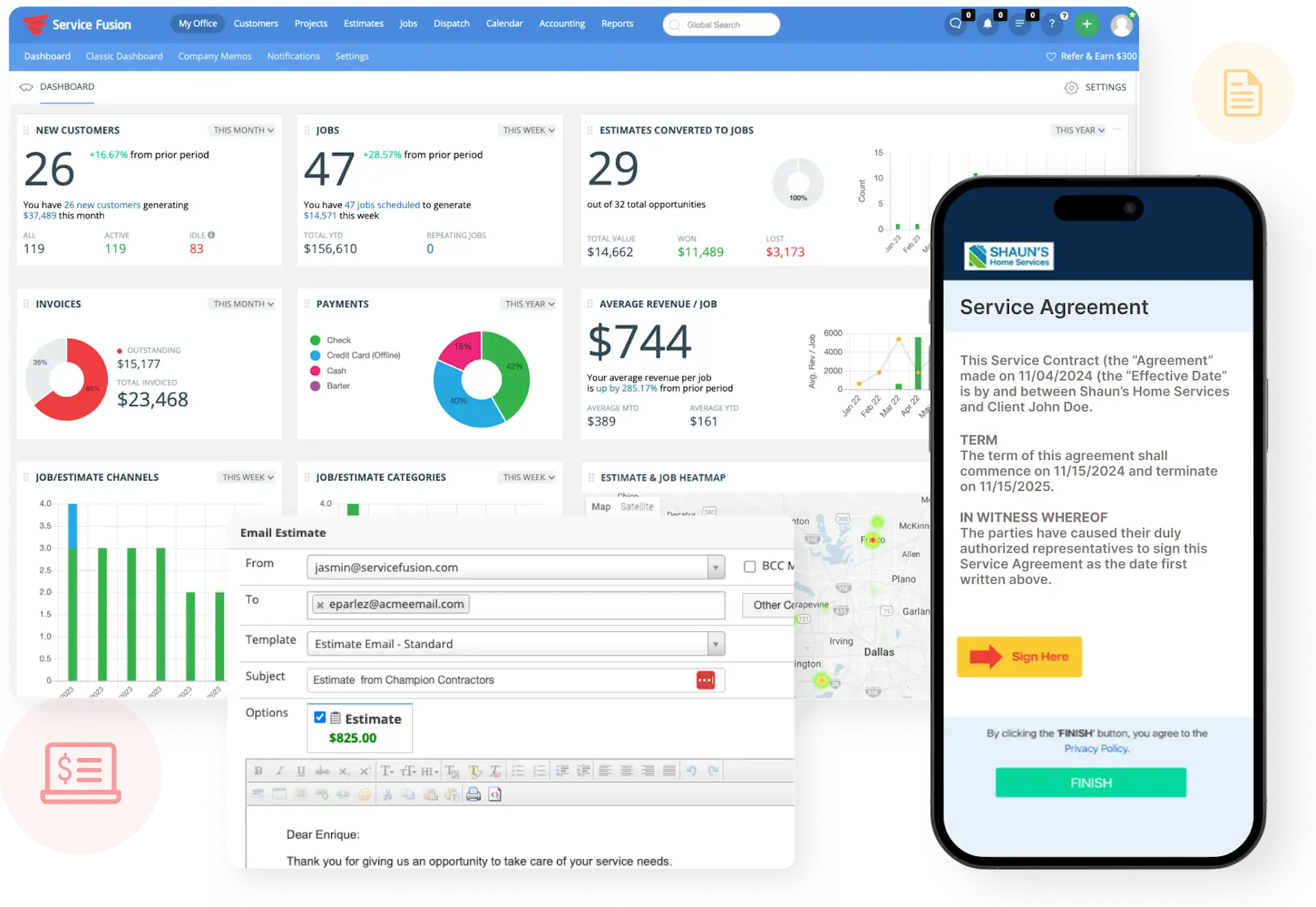
Service Fusion field service software streamlines customer communication and fleet management for businesses. Teams can generate and share clear job estimates outlining expected costs and services. Customers can approve terms and sign electronically, reducing paperwork and speeding up approvals.
Technicians have the ability to add notes to customer profiles, recording preferences, requirements, and special instructions. This information helps field teams personalize their approach and consistently meet customer needs during service visits.
Features:
Live dashboards and reporting
Customer SMS messaging
Mobile app for field teams
Scheduling and dispatch tools
Work order organization
Electronic document signing
Flexible estimate options
Pricing: Plans begin at $192 per month, billed annually.
Key Capabilities of Field Service Software
According to industry research such as the McKinsey’s State of Customer Care report, 88% of customer experience leaders find the rapid changes in customer service overwhelming. This challenge also affects field service agents who support customers with products or equipment. Customer expectations for fast responses and quick solutions are increasing. When selecting field service software, it’s important to prioritize features that improve efficiency, streamline workflows, and enhance service quality.
Key features to look for:
Live dashboards and reports: Companies can track key performance data, monitor field teams, and make data-driven decisions. This complete overview of current operations helps improve productivity, resource allocation, and efficiency.
Connection with your business systems: Having robust REST APIs and Webhooks ensures your field service platform can integrate seamlessly with ticketing systems, ERP solutions, and other tools, enabling quick, tailored workflows that enhance both operational efficiency and team productivity.
Mobile app for field teams: Technicians can view essential information, work orders, and client details from your service desk software directly on their mobile devices.
Task scheduling and dispatch: Dispatchers can quickly update assignments based on team members’ skills, location, and availability, often using automation to make scheduling smoother.
Work order tracking: Companies can organize, assign, and follow tasks in a clear interface, minimizing manual mistakes.
Tracking between teams and locations: Using NFC, QR, GPS, or Virtual points for check-ins ensures precise tracking of field activities, real-time updates, and secure verification of task completion, empowering both management and teams with accurate, reliable data and streamlined operations.
Effortless handling of on-site problems: Integrated issue management enables field teams to quickly report incidents, attach photos or videos, and track resolutions in real time. This ensures faster response times, improved transparency, and better decision-making for both managers and teams.
These features help businesses run field operations smoothly, improving both productivity and customer satisfaction.
Advantages of field service software
Companies see major improvements when they use field service software, particularly if it includes or connects easily with key customer experience (CX) solutions.
Businesses often realize the most significant benefits in the following areas:
Enhanced customer experience: Customers receive timely and accurate updates about their appointments.
Increased productivity: Request management systems assign tasks to field workers based on skill set, location, and current availability, reducing downtime and unnecessary travel.
Better communication: Field technicians and dispatchers use a centralized platform to send and receive real-time updates about service tickets, inventory, and operational decisions.
More efficient processes: Automated workflows simplify work order management, from creation and assignment to inventory tracking.
Ultimately, FSM software helps teams operate in a more organized, agile, and customer-focused way across all field service activities.
Selecting the Best Field Service Solution
Selecting the right field service solution plays a key role in improving the efficiency and effectiveness of your operations.
Keep these essentials in mind when choosing software to ensure it meets your needs:
Check for integration with your customer service software: The right field service tool should connect smoothly with your help desk software. This ensures information flows easily and gives you a complete view of customer interactions. Tools like Zendesk also offer advanced features, such as customer service management and workforce management to help you plan and monitor staffing more effectively.
Look for customization options: Every business has its own processes and needs. Choose a solution that lets you adjust settings to fit your workflow.
Use a free trial: Trying the software firsthand lets you see how it performs and whether it fits your field service operations before making a commitment.
A field service management solution that meets these criteria will enable you to provide faster, more reliable service in the field.
Frequently asked questions
In what ways does field service management software assist with dispatching?
FSM software streamlines dispatch by matching field workers to tasks according to their skills, location, and availability. Automated scheduling optimizes routes, helping to cut down on travel time and reduce operational expenses. Dispatchers can also use the software to communicate directly with technicians, sharing job information, updates, and changes instantly.
What is the cost of field service management?
Field service software pricing can range significantly. Typically, monthly costs start at $16 and can exceed $400. The price is influenced by factors such as the number of users, the amount of tickets handled in the service desk, and the specific features offered.
Who benefits from using field service management software?
Field service software is used by a wide variety of businesses that provide on-site services, handle maintenance, or carry out installations. Common industries that rely on FSM software to improve their field operations include:
Utility services
Telecommunications
Building and construction
Heating, ventilation, and air conditioning (HVAC)
Facility management
Logistics operations
Maintenance and repair services
How does FSM help reduce incident resolution times for help desks?
Integrating field service management tools with help desk software can significantly improve help desk performance. For instance, ticketing system software streamlines ticket assignment and routing, enabling field service agents to address issues more quickly. A knowledge base empowers customers to find answers themselves, reducing the number of tickets agents need to handle. Additionally, AI tools help agents provide more accurate and efficient support.
What difficulties arise when combining field service and help desk solutions?
Connecting your field service operations with help desk tools is straightforward when you select an intuitive, ready-to-use platform like TARGPatrol. This approach ensures your remote and field teams can get started quickly, reducing training time and implementation costs. Additionally, information moves seamlessly between systems, keeping your data consistent.
Related posts:

